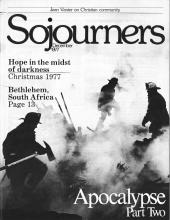Third Sunday of Advent
December 11, 1977
Isaiah 35:1-6, 10; James 5:7-10; Matthew 11:2-11
I look out my window on this crisp fall morning and see a contrast of darkness and light. My home is in a basement apartment in the middle of the city. At the farthest point of what I can see is a beautiful towering tree bathed in the early morning sun. The tree is robed in the glorious colors of autumn.
But this wondrous view is enclosed in bars. I live in the city and persons before me have learned that there can be danger in the darkness. My comfortable apartment has windows with bars over them. I possess what others would like to have. And I too must admit this same concern for security.
The fences in my line of vision have been erected to keep me out of the space and life of my neighbors. Each claims his or her own fiefdom in these small tracts which are so valuable in the city. My heart is warmed by the thought that the squirrels and the birds are not intimidated by the fences.
I see garages. Old garages of aging brick and rusting metal acting as storehouses for our modern symbol of wealth, the highly-polished automobile. Or, if the car be abandoned, we store our accumulated junk there. Things cast out of our home but with which we cannot yet part, we store there for holding. And the phenomenon of "garage sales" tells us that we cannot even bear to give away our refuse.
All of these human works are still shrouded in the early morning darkness. But through all of the jungle of "civilized life" I can see the tree of light. And I have hope!
Read the Full Article

